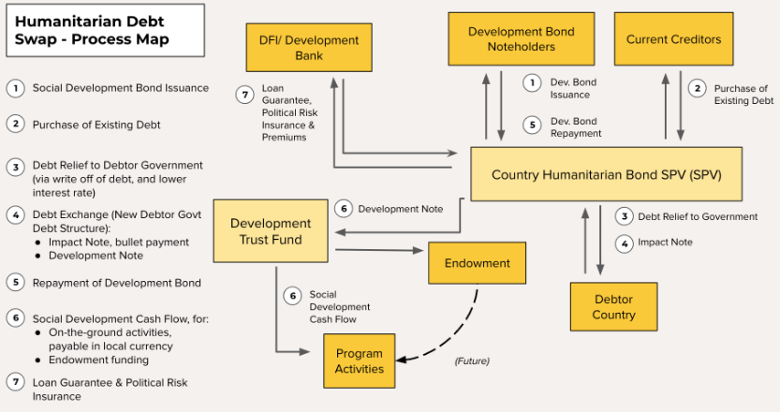
Humanitarian Debt Swaps
An innovative transaction to refinance sovereign debt in fragile contexts, resulting in new funding streams for communities at the frontline of conflict and climate crisis.
The aim of this proposal is to replicate an innovative transaction to refinance sovereign debt in fragile contexts, resulting in new funding streams for communities at the frontline of conflict and climate crisis. Based on recent examples of sovereign ‘debt for nature’ restructuring, IRC proposes a ‘humanitarian debt swap’ that will help targeted countries restructure outstanding below investment-grade commercial sovereign debt, freeing up hundreds of millions of dollars for conflict-affected, refugee-hosting, climate-prone communities.
The problem:
· The financing gap for conflict and climate-affected populations is growing: There are a number of countries that have high levels of poverty and sovereign debt, are conflict affected or hosting refugees, and face climate vulnerability that exacerbates all the above. International donors cannot address this increasing humanitarian need, with the funding gap between appeal figures and humanitarian commitments rising from $8Bn in 2015 to $20Bn today. Debt-distressed countries are forced to pay high interest rates on their sovereign debt, which limits how much support they can provide to their populations, adapt for climate impacts, or support refugee/displaced populations they host.
· Countries hosting conflict-affected populations are more likely to be debt distressed: According to the IMF, as of January 31, 2023, 9 countries are in debt distress, 28 countries are at high risk and 25 countries are at moderate risk. This debt is even more severe for countries hosting displaced communities shouldering the economic burden. High levels of debt also force difficult choices between servicing debt with public dollars or spending on essential services like health, an underinvestment which threatens development gains and can increase the need for humanitarian assistance.
A ‘debt for aid swap’ that builds on the innovative ‘debt for nature swap’
IRC's Proposal:
This transaction will involve a restructure of existing sovereign debt - buying back the existing sovereign debt bonds held on capital markets at a discount and creating a new loan obligation which would be funded by the sale of ‘aid’ or ‘humanitarian’ bonds. These bonds would have a higher credit rating and lower interest rate due to a guarantee mechanism made available from the US International Development Finance Corporation (DFC), a development finance institution and agency of the United States federal government.
In doing so, the existing sovereign debt bonds that would otherwise be rated high-risk because of their likelihood of default and therefore traded by junk bond investors would be exchanged for new bonds rated above investment grade and be able to access a new an investor pool of global insurance companies, pension funds, high net-worth individuals, and asset managers. These bonds would also be considered ‘ESG’ (environmental, social and governance) bonds, investment products that are in high demand.

In exchange for this debt restructure, the country would commit a portion of the savings towards new funding for frontline and fragile communities, such as refugee and host communities, which are bearing the brunt of climate change’s effects and participating in social safety systems in host countries. This money would be administered by a grant-making trust fund managed by a separate board composed of civil society and government stakeholders. The use of proceeds would be negotiated and formalized in governing documents in advance of the debt-swap transaction. The use of proceeds would be primarily determined by a third-party entity to the transaction, such as an NGO, which would develop a proposal for the highest impact outputs and outcomes for the funding proceeds.
To learn more about the Advisory Model or to partner with IRC, download our white paper on humanitarian debt swaps or contact Ellen Brooks at Ellen.BrooksShehata@rescue.org.
Related Links
Project Timeline
Publishing White Paper
IRC publishes white paper on humanitarian debt swaps and kicks off the search of a partner to further develop the initiative in 2024 during World Economic Forum at Davos.
Resource